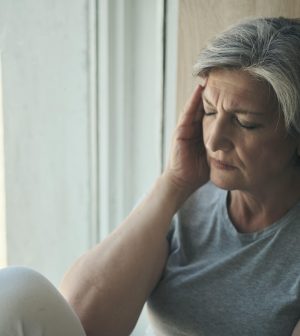- Could Your Grocery Store Meat Be Causing Recurring UTIs?
- Are You Making This Expensive Thermostat Error This Winter?
- Recognizing the Signs of Hypothyroidism
- 10 Strategies to Overcome Insomnia
- Could Artificial Sweeteners Be Aging the Brain Faster?
- Techniques for Soothing Your Nervous System
- Does the Water in Your House Smell Funny? Here’s Why
- Can a Daily Dose of Apple Cider Vinegar Actually Aid Weight Loss?
- 6 Health Beverages That Can Actually Spike Your Blood Sugar
- Treatment Options for Social Anxiety Disorder
Clinics Hawking Bogus Stem Cell Cures for Long COVID Are Everywhere

Dozens of fly-by-night businesses are marketing unproven and potentially dangerous stem cell treatments to people experiencing long COVID, a new study warns.
Researchers have identified 38 businesses engaged in direct-to-consumer marketing of purported stem cell treatments and exosome therapies for treating COVID.
These businesses are exploiting the desperation of people with long COVID, for which there are no proven therapies, said lead researcher Leigh Turner, a bioethics professor with the University of California, Irvine.
“Thirty-six out of the 38 businesses we found were making claims about stem cells and exosomes as treatments for long COVID,” Turner said. “They don’t acknowledge that they’re selling unapproved products or that these are unproven or experimental.”
People with long COVID have a wide range of symptoms that can last weeks, months or even years after infection, according to the U.S. Centers for Disease Control and Prevention.
These symptoms can include brain fog, fatigue, breathing problems, heart palpitations and digestive issues, the CDC says.
About 1 in 10 patients who’ve had COVID are currently suffering from long COVID, according to a KFF survey published earlier this year.
There are only a few stem cell treatments approved by the U.S. Food and Drug Administration, and these are aimed at treating certain cancers, blood diseases or immune disorders, the CDC says.
Further, there are no approved exosome treatments whatsoever. Exosomes are microscopic bubbles full of biochemicals that are produced by stem cells.
“Exosomes are stem cell-derived,” Turner said. “The claim is that this is a safer way to do it because live viable stem cells aren’t being administered to individuals, so this reduces the possibility of complications while having all the benefits of stem cells.”
In the early months of the pandemic, Turner helped produce a similar analysis showing that U.S. businesses were marketing unlicensed and unproven stem cell-based therapies as COVID treatments.
This update found that many businesses have shifted from those claims and now are hawking their wares as a treatment for long COVID, Turner said.
The cost of these treatments ran from around $3,000 to $25,000, the researchers reported.
The researchers identified 60 clinics operated by the 38 businesses, with 24 based in the United States and 22 based in Mexico.
The findings were published online Oct. 26 in the journal Stem Cell Reports.
“Many Americans are not necessarily going to go elsewhere, to clinics located outside the United States,” Turner said. “These are domestic operations, and they’re going to attract people traveling within the United States.”
These treatments aren’t without risk. People given stem cells or exosome therapy run the risk of infections, pulmonary embolism, stroke and the development of tumors, according to Turner and the CDC.
“Not only might they spend money and not benefit, they might spend money and then have a very serious complication,” Turner said.
Dr. William Schaffner, a professor of infectious diseases and preventive medicine at Vanderbilt University in Nashville, Tenn., hadn’t heard of stem cell treatments being marketed for long COVID, but he wasn’t particularly surprised by it.
“When there is not a well-regarded treatment for a chronic and debilitating illness, there are frequently charlatans and others who will come forward with purported treatments for which there’s no scientific or medical basis, and they will prey on these individuals,” Schaffner said. “And that’s what this sounds like to me.”
Turner urges long COVID patients to be skeptical of claims made in absence of medical evidence.
“There is a marketplace out there that’s kind of happy to take advantage of their situation and take advantage of their suffering and exploit it,” Turner said. “For individuals who are looking for help, there are a lot of products being sold on a direct-to-consumer basis where there’s not any evidence they’re going to help.”
Schaffner agreed.
“If it seems too good to be true, it probably is too good to be true,” Schaffner said.
“You should ask yourself a very simple question — if there is a treatment available for your illness, in this case long COVID, why is it that the general medical community is not telling you about it? Why is that not part of the regular medical care that’s available through physicians and clinics and medical centers? It doesn’t make sense that the general medical community would ignore something that works to benefit patients,” Schaffner advised.
More information
The U.S. Centers for Disease Control and Prevention has more about stem cell and exosome therapies. Meanwhile, the U.S. Food and Drug Administration has issued a public safety notification on exosome products.
SOURCES: Leigh Turner, PhD, bioethics professor, University of California, Irvine; William Schaffner, MD, professor, infectious diseases and preventive medicine, Vanderbilt University, Nashville, Tenn.; Stem Cell Reports, Oct. 26, 2023, online
Source: HealthDay
Copyright © 2026 HealthDay. All rights reserved.










